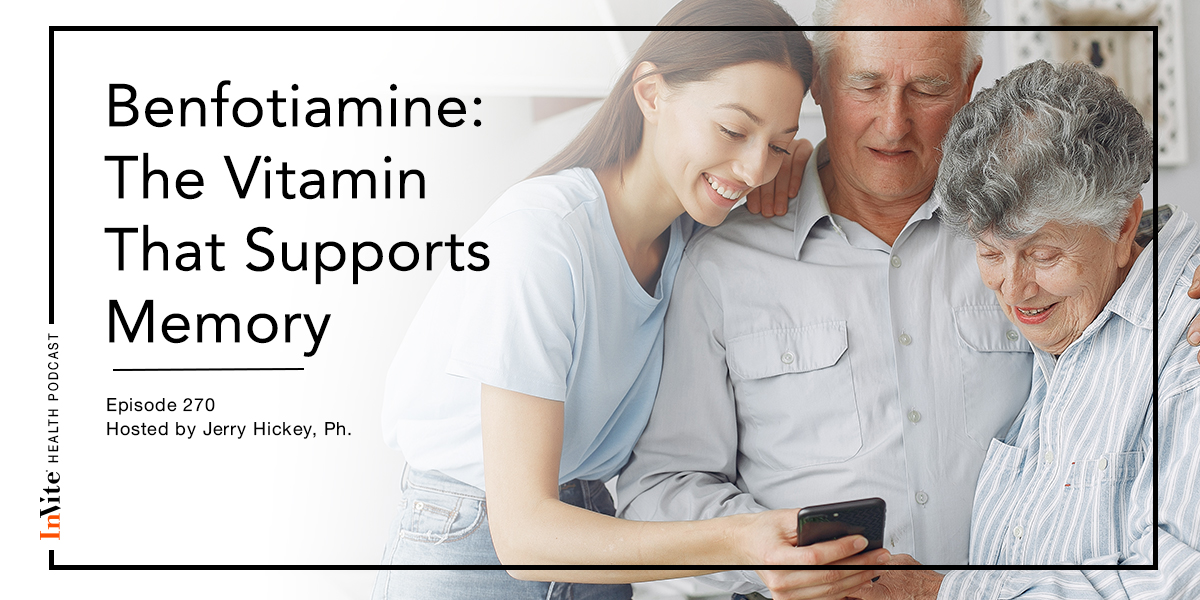Benfotiamine: The Vitamin That Supports Memory – InVite Health Podcast, Episode 270

benfotiamine
Invite Health Podcast, Episode hosted by Jerry Hickey. Ph
Subscribe Today!
Thiamine is a B vitamin. It’s part of the B vitamin complex and it’s dubbed Vitamin B1. It’s involved with many important activities in the human body, including creating energy out of the sugar in your food, blood sugar control, heart health, nerve health and brain health. Issues with the ability to utilize thiamin are connected with diabetes, heart damage, severe memory issues and nerve damage. A form of thiamine called benfotiamine can be helpful for those issues. Today, I’m going to address the effects of benfotiamine on the brain and for memory issues.
Vitamin B1 levels in elderly people
Some elderly people have a risk for developing problems with utilizing Vitamin B1, known as subclinical thiamine deficiency. This could be related to a poor diet. A lot of elderly people who live alone are not exactly eating in a healthy way. It can also be related to the absorption of thiamine. They’re having problems absorbing thiamine from their food. Alcohol messes with your thiamine, so alcoholics have terrible diseases of the brain related to B1. Many health conditions and some drugs also affect the ability of the elderly to utilize thiamine.
A very poor ability to utilize thiamine or lacking thiamine are related to dementias, like Wernicke-Korsokoff Syndrome. You see this in alcoholics. They’re also now finding a strong connection with Alzheimer’s disease. In fact, they’re connecting diabetes and Alzheimer’s. Diabetics can’t utilize the sugar in their blood for energy and they can’t effectively control the level of sugar in their blood, which leads to all kinds of problems and many problems with the brain. Some researchers are referring to Alzheimer’s disease as diabetes of the brain. Just like a diabetic cannot use sugar for energy, in people with Alzheimer’s disease, their brain cannot use Vitamin B1. The inability to use Vitamin B1 leads to poor ability to use sugar in the brain for energy. Sugar is the number one source of energy for your brain.
Protect Your Body Against Sugar-Induced Damage with Benfotiamine – Invite Health Podcast, Episode 90. Listen Now >>
Learn more about the link between sugar in the brain and memory issues by tuning into the full podcast episode.
Researchers find a reduction in Vitamin B1-dependent activities related to altered sugar metabolism in the brains of patients with Alzheimer’s disease. They can’t use Vitamin B1 properly, they can’t use sugar properly and they get worsening Alzheimer’s disease.
There was a case-controlled study in 38 elderly women. Blood levels of thiamine and its metabolites were lower in those with Alzheimer’s disease-type dementia. They did post-mortem studies of patients who died from Alzheimer’s. It’s not just that they had Alzheimer’s, they died from Alzheimer’s. Researchers did post-mortem studies of their brains and they found decreased thiamine activity. There are enzymes like alpha-ketoglutarate, dehydrogenase and transketolase that are involved with healing, energy production, metabolism and more. These were just lacking in the brains of people who died with Alzheimer’s disease. All of this evidence adds to the scenario that there’s something about thiamine and severe memory loss.
For more studies about the impact of thiamine on memory functions, listen to the full podcast episode.
In mild cognitive impairment patients, benfotiamine has reduced deterioration of the brain in human clinical trials and improved their brain functions. In patients with mild Alzheimer’s disease, it slowed down loss of brain and physical function and it’s actually improved their brain function over quite a long time.
How Tart Cherry Offers Support For Memory Health – InVite Health Podcast, Episode 238. Listen Now >>
My recommendation if you’re older is to get a benfotiamine capsule, 200mg, and take one a day with your breakfast. If you’re diabetic, maybe you’re better off with one twice a day, one with breakfast, one with lunch. You take it with food because it’s absorbed better with food. If you have a relative with Alzheimer’s, give them 200mg twice a day and make sure to tell their doctor and nurse. They need to know about this.
What do you think about Benfotiamine? Have you heard about it before? Do you have any questions? Leave us a comment below to join the conversation!
Thank you for tuning in to the Invite Health Podcast. You can find all of our episodes for free wherever you listen to podcasts or by visiting www.invitehealth.com/podcast. Make sure you subscribe and leave us a review! Follow us on Facebook, Twitter and Instagram at Invite Health today. We’ll see you next time on another episode of the Invite Health Podcast.


